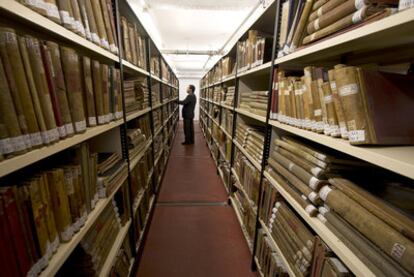Conde Duque: the new beating heart of Madrid's cultural archives
The refurbished military barracks is now home to a wealth of research material
Six years of reforms and 70 million euros later, Conde Duque is a military barracks once again. Well, at least on the outside. Since January 1, the entire 58,777 square meters that make up this landmark site in Madrid have been open to anyone wishing to explore the capital's culture.
The west wing of Conde Duque sports a brand new public library specializing in historical documents, an archive, a newspaper library, a theater with seating for 250 spectators, an auditorium with 300 seats, an exhibition room, a rehearsal room and an assembly room.
On the outside, the Conde Duque building has been stripped back to its former glory, after the architect Carlos de Riaño removed the pink-hued rough render that had covered its walls for nearly 300 years, revealing the original brick.
Inside, it is finally possible to explore every nook and cranny after Madrid's infrastructure chief, Juan José Echeverría, oversaw the transfer of the monumental Archivo de la Villa, the city archive and Madrid's oldest cultural institution, with 19 kilometers of underground shelves. Meanwhile, the newspaper library contains printed matter from the 17th century onwards, while the library has an extensive music and digital catalogue.
The new and improved building also has a new heart- although perhaps a more accurate description would a pacemaker. It is a digital organ called www.memoriademadrid.es, a website that collects, displays, archives, searches and, in short, sets the pace of the new cultural center. The website allows visitors to find out what happened on a day like today, two centuries ago, or to explore the city's history through images. The site contains nearly a million digital files, all painstakingly uploaded by a team. Echeverría forecasts that it will "become a place of reference for conservation and research work on the history of Madrid, and in that sense it will play an essential role."
Sufficient space and quality content are the foundations of any self-respecting cultural center, but there is still one more essential ingredient: it must have a soul. And anyone who comes to the west wing of Conde Duque can meet that soul: the archivist Carmen Cayetano, who has been the custodian of the city's documents for the last 39 years.
"At first, part of the archive was kept in the basement of Plaza Mayor, where it sat among water pipes, mice and cockroaches," she recalls. "The other portion was kept in the lost-and-found department, although we always knew where things were."
Now that the documents are safe and sound in their bright new home, which even contains a few historical pieces of furniture, accessibility has been vastly improved. "Before this, some of the files were five meters above the ground," says Cayetano. She and her colleagues are now busy digitalizing the entire archive.
Cayetano keeps amazing secrets, like the blueprints for a hospital for plague victims designed by the 18th-century architect Juan de Villanueva, and which was never built. "It is a beautiful isolation hospital," she says, admiring the enormous floor plans that show a hexagonal building. "There was a yellow fever epidemic and he designed a hospital center that would cut the road access to the City of Angels, as it was surrounded by a pit."
The newspaper archive, with 250,000 volumes containing over five centuries' worth of news printed in dailies, magazines and other publications, takes up 20 kilometers of shelf space. It is guarded by its director, Carlos Dorado, another passionate fan of paper who has helped get 17 million pages microfilmed ever since the project began in 1984.
Founded in 1916, it was Spain's first newspaper archive and as such it soon built up a significant collection that includes comprehensive newspaper coverage of the Spanish Civil War (1936-1939).
"You can follow the history of the press in Madrid, Spain and the world, because we also keep issues of foreign newspapers and magazines," says Dorado. "We've started keeping all the Chinese newspapers that are being printed in Madrid, although for now we can't understand a word of it."

Tu suscripción se está usando en otro dispositivo
¿Quieres añadir otro usuario a tu suscripción?
Si continúas leyendo en este dispositivo, no se podrá leer en el otro.
FlechaTu suscripción se está usando en otro dispositivo y solo puedes acceder a EL PAÍS desde un dispositivo a la vez.
Si quieres compartir tu cuenta, cambia tu suscripción a la modalidad Premium, así podrás añadir otro usuario. Cada uno accederá con su propia cuenta de email, lo que os permitirá personalizar vuestra experiencia en EL PAÍS.
¿Tienes una suscripción de empresa? Accede aquí para contratar más cuentas.
En el caso de no saber quién está usando tu cuenta, te recomendamos cambiar tu contraseña aquí.
Si decides continuar compartiendo tu cuenta, este mensaje se mostrará en tu dispositivo y en el de la otra persona que está usando tu cuenta de forma indefinida, afectando a tu experiencia de lectura. Puedes consultar aquí los términos y condiciones de la suscripción digital.








































